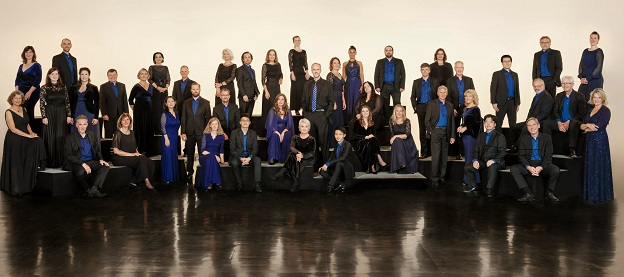How well does the symphonist Bruckner write for the voice and especially for the choir?
I think it’s important to emphasize that Bruckner comes from the choral tradition. He was a chorus boy in St. Florian and also trained as an organist there. So he really came from church music and wrote for chorus, chorus and orchestra as well as chorus and organ from an early age. He was also a fanatical counterpoint player, I would say.So he went back to Vienna relatively late, in the 1850s, when he was already over 30 years old, to study very intensively with Simon Sechter who was a well-known teacher and counterpoint composer from this period. And that’s when he expanded his skills as a composer and especially as a counterpoint composer. And he was an absolute master in this area and wrote his great masses in the 1860s, the first in D minor, the second with winds, which we also recorded, and the third in F minor. After that he began to compose the great symphonies.
What characterizes his choral compositions and how do they differ from symphonic works?
It is clear that the possibilities of a chorus are completely different to the possibilities of a symphony orchestra. And, of course this runs through various areas, such as the length of the phrases, but also the development of the sound – it’s clear that it’s different with a chorus, and more limited. And then there is also the fact that choral music is of course always related to the text. This means that the text is the inspiration, but somewhere in the phrasing it is perhaps limited to a certain extent. It has to do with the emphasis, the punctuation, commas and so on, and how the exact phrasing is formed. And of course, when you write for symphony orchestra and compose a symphonic development, you are much freer. So the form is completely different, as are the possibilities – those are actually the two important things.
What are the challenges for the conductor and the chorus?
Bruckner’s music is often quite chromatic, and the lines are very, very long. Which of course means that, firstly, you have to maintain the tension as a chorus and conductor in order to create this very long vocal arc. But you also have to pay attention to the intonation of the modulations, there are some hidden dangers here and there. And of course you have to be aware of that and work together very well so that everything works smoothly. Thank God, the Bavarian Radio Chorus is a great master in this area, and I believe that it is possible to accept these challenges with this outstanding chorus and to do it excellently.
Why do the general public only know Bruckner’s symphonies and hardly any of the choral works?
First of all, I think that this is due to the fact that concert life is more tailored to orchestral music and less to choral music. In Munich, we have the wonderful fact that we have a fully booked choral subscription series with the Bavarian Radio Chorus in the Prinzregententheater with more than a thousand listeners at each concert. But still, compared to the orchestras, it’s more the fact that the orchestra simply has a bigger audience. Secondly, from his 70s onwards, Bruckner’s focus was clearly on symphonic music and less on choral music. And it was in this medium that he was able to develop best, that he wrote the most repertoire. And it is simply incredible music. So he was less involved with choral music during the time of these later symphonies. He still wrote some really, really great a cappella motets, such as Christus, factus est, as well as less well-known ones. But his focus was of course on symphonic music.
How do you see Bruckner today? The conductor Hans von Bülow even described him as « half genius, half fool »….
It is now around 130 years since Bruckner died. In Hans von Bülow’s time, he was of course better known as a personality and perhaps almost all of his works were better known. Now it’s the other way around, Bruckner’s music is of course in the foreground, and in the course of the twentieth century the appreciation of his music, especially his symphonic music, became greater and greater through the interpretation of many musicians and conductors. And yes, that’s why I think there’s less focus on the personality aspects and much more on the music.
For me personally, when I go to a concert, this music is almost a sacred experience when I hear a symphony. I am always amazed at the incredible power of the music and how it is constructed. And yes, it is an incredible journey. It’s as if you’re almost in another world when everything comes together in concert, when it’s a good performance, when the tension is well distributed, then it’s a very impressive experience. As musicians, as a world, we are richly blessed by this music, which for me has a great, comforting quality. Bruckner’s music purifies my soul.























